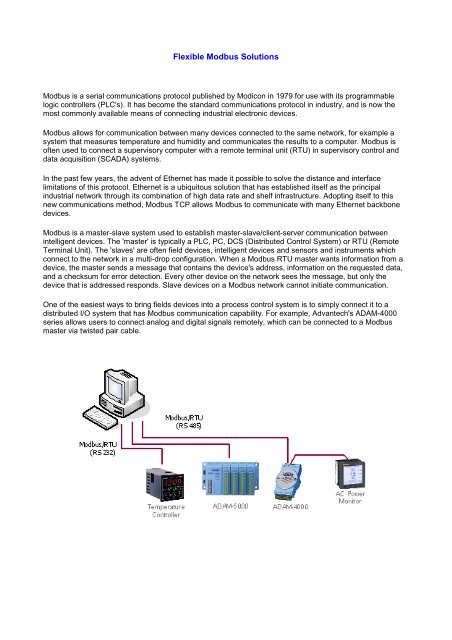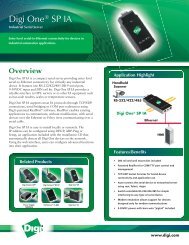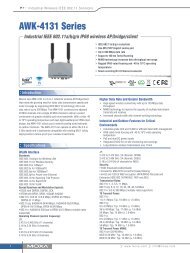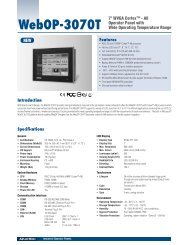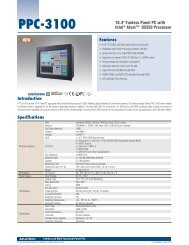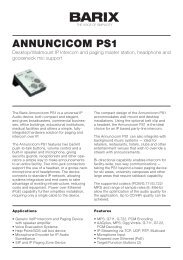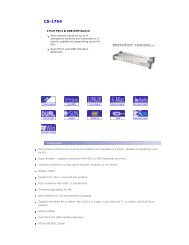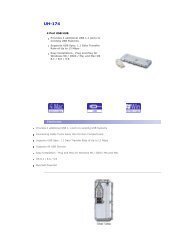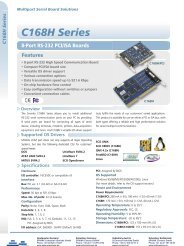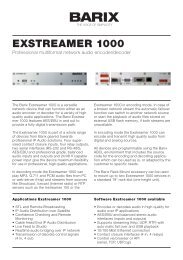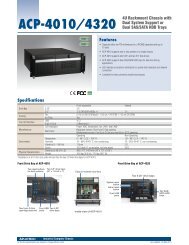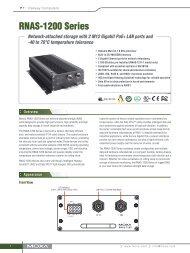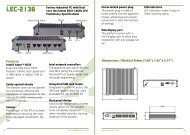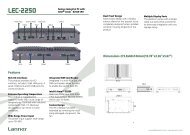Modbus Application Note (397.5 kB) - Sphinx Computer
Modbus Application Note (397.5 kB) - Sphinx Computer
Modbus Application Note (397.5 kB) - Sphinx Computer
Create successful ePaper yourself
Turn your PDF publications into a flip-book with our unique Google optimized e-Paper software.
Flexible <strong>Modbus</strong> Solutions<br />
<strong>Modbus</strong> is a serial communications protocol published by Modicon in 1979 for use with its programmable<br />
logic controllers (PLC's). It has become the standard communications protocol in industry, and is now the<br />
most commonly available means of connecting industrial electronic devices.<br />
<strong>Modbus</strong> allows for communication between many devices connected to the same network, for example a<br />
system that measures temperature and humidity and communicates the results to a computer. <strong>Modbus</strong> is<br />
often used to connect a supervisory computer with a remote terminal unit (RTU) in supervisory control and<br />
data acquisition (SCADA) systems.<br />
In the past few years, the advent of Ethernet has made it possible to solve the distance and interface<br />
limitations of this protocol. Ethernet is a ubiquitous solution that has established itself as the principal<br />
industrial network through its combination of high data rate and shelf infrastructure. Adopting itself to this<br />
new communications method, <strong>Modbus</strong> TCP allows <strong>Modbus</strong> to communicate with many Ethernet backbone<br />
devices.<br />
<strong>Modbus</strong> is a master-slave system used to establish master-slave/client-server communication between<br />
intelligent devices. The 'master' is typically a PLC, PC, DCS (Distributed Control System) or RTU (Remote<br />
Terminal Unit). The 'slaves' are often field devices, intelligent devices and sensors and instruments which<br />
connect to the network in a multi-drop configuration. When a <strong>Modbus</strong> RTU master wants information from a<br />
device, the master sends a message that contains the device's address, information on the requested data,<br />
and a checksum for error detection. Every other device on the network sees the message, but only the<br />
device that is addressed responds. Slave devices on a <strong>Modbus</strong> network cannot initiate communication.<br />
One of the easiest ways to bring fields devices into a process control system is to simply connect it to a<br />
distributed I/O system that has <strong>Modbus</strong> communication capability. For example, Advantech's ADAM-4000<br />
series allows users to connect analog and digital signals remotely, which can be connected to a <strong>Modbus</strong><br />
master via twisted pair cable.
There are three common <strong>Modbus</strong> version used today:<br />
• <strong>Modbus</strong>/RTU<br />
• <strong>Modbus</strong>/ASCII<br />
• <strong>Modbus</strong>/TCP<br />
All <strong>Modbus</strong> messages are sent in the same format. The only difference among the three <strong>Modbus</strong> types is in<br />
how the messages are coded.<br />
In <strong>Modbus</strong>/ASCII, all messages are coded in hexadecimal, using 4-bit ASCII characters. In <strong>Modbus</strong> RTU,<br />
data is encoded in binary, and requires only one communication bytes per data byte. This is ideal for use<br />
over RS-232 or multi-drop RS-485 networks, at speeds from 1200 to 115K baud. The most common speeds<br />
are 9600 and 19200 baud. <strong>Modbus</strong>/RTU is the most popular used between these common <strong>Modbus</strong> protocol.<br />
<strong>Modbus</strong>/TCP is often referred to as <strong>Modbus</strong> over Ethernet. TCP/IP is the common Internet protocol,<br />
providing a reliable data transport mechanism between machines. Ethernet is the standard of corporate<br />
enterprise systems and has also become the standard for factory networking. Instead of using device<br />
addresses to communicate with slave devices, IP addresses are used. For the most part, <strong>Modbus</strong>/CP is<br />
simply <strong>Modbus</strong> packets encapsulated in standard TCP/IP packets.<br />
Most PLC vendors have adopted their own proprietary protocol over Ethernet, but almost all of them support<br />
<strong>Modbus</strong>/TCP. Another advantage of <strong>Modbus</strong>/TCP is ability to support multiple masters. <strong>Modbus</strong>/TCP will<br />
allow multiple masters to poll the same slave device simultaneously. It's much more flexible than<br />
<strong>Modbus</strong>/RTU and <strong>Modbus</strong>/ASCII.<br />
Connecting <strong>Modbus</strong> Devices<br />
Intelligent field devices, control systems, and PLC's have <strong>Modbus</strong> communication capability, and can act as<br />
slaves or masters. These devices will be networked via Ethernet and located around the factory or plant.<br />
Most of the time, a PLC will act as a <strong>Modbus</strong>/TCP master, so it can have access to (and control) the<br />
hundreds of <strong>Modbus</strong>/RTU or <strong>Modbus</strong>/ACSII devices on the network. Advantech's ADAM-4572 for example,<br />
translates <strong>Modbus</strong>/TCP requests to <strong>Modbus</strong> slaves and relies on the responses from the <strong>Modbus</strong>/TCP<br />
master transparently.
In most factories, a highly reliable control and monitoring system is one of the most important elements.<br />
Advantech's EKI-1221, EKI-1222 and EKI-1224 (EKI-1220 series) not only have all features of the ADAM-<br />
4572, but also support dual Ethernet port connection and Multi-access functionality. Dual Ethernet ports<br />
allow the EKI-1220 series to establish two separate physical Ethernet connections so that if one of the<br />
connections is broken, the <strong>Modbus</strong> gateway will switch to the other connection automatically. This idea of<br />
'redundancy' within a network can guarantee that devices will always be connected and that information will<br />
never be lost.<br />
In some cases, existing plants may have a <strong>Modbus</strong>/RTU master. The challenge in these systems is that the<br />
<strong>Modbus</strong>/RTU master not only accesses the <strong>Modbus</strong>/Slave, but also collects the <strong>Modbus</strong>/TCP slave data.<br />
Again here, Advantech's EKI-1220 series provides an inexpensive and convenient way to support <strong>Modbus</strong> to<br />
<strong>Modbus</strong>/TCP translation. In this way the <strong>Modbus</strong>/RTU master can deal with the <strong>Modbus</strong>/TCP slaves without<br />
any significant changes to the network architecture.
Another challenge for existing plants is the possibility of having hundreds of field devices installed around the<br />
factory connected by twisted cables. This typical setup is very difficult to expand and maintain. While it is<br />
possible to acquire the benefits of Ethernet and integrate these devices, this is rarely done due to its difficulty<br />
and cost. Here too, Advantech's EKI-1220 series provides an excellent way to fully integrate all <strong>Modbus</strong><br />
devices over the Ethernet network.<br />
Although <strong>Modbus</strong> is one of the oldest communication protocols, it is still the most popular, easy to use,<br />
reliable, and inexpensive communication protocol. However, <strong>Modbus</strong>/TCP has become ubiquitous due to its<br />
openness, simplicity, low-cost, and minimum hardware required to support it. Integrating hundreds and<br />
thousand of field devices and control systems in a modern factory is one of the most difficult changes a<br />
company can face, and yet Advantech's EKI-1220 series now provides an easy solution with redundant<br />
network capability and multi-access capacity.


